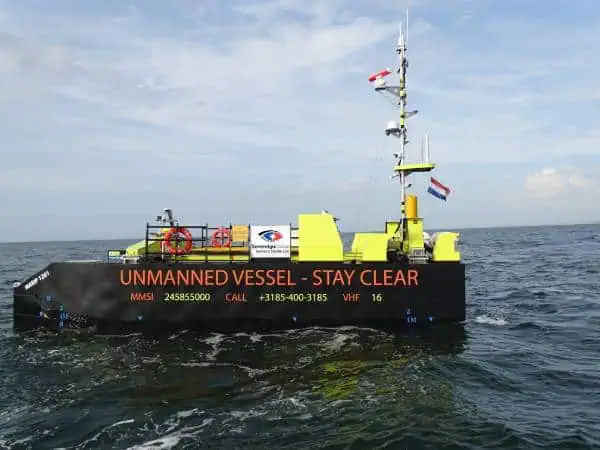Automated vessels are a new horizon for the shipping industry and the start of a new chapter in its long history. With strong experience in marine automation, RC Dock has achieved a milestone with class approval of its first Remotely Controlled Unmanned Workboats to operate up to 200 nautical miles from shore.
RC Dock, based in Ijmuiden in The Netherlands, is known for its innovative application of the latest technologies to support the shipping industry, including Unmanned Surface Vessels (USVs), automated USV mooring and refuelling docks, and USV launch and recovery systems. RINA has classed the first of its 20 new workboats that are able to conduct remotely controlled unmanned operations in areas such as Offshore Survey and Subsea Inspection, Maintenance and Repair (IMR).
Guido Garufi, Business Development Manager Benelux & North of France at RINA, says, “Autonomous and Remotely Controlled Unmanned Vessels are widely recognised as the future for many areas of shipping. This exciting project with RC Dock sees our first approval of this type of vessel and gives us valuable experience to support the industry as it embraces more and more automation.”
The workboats, which are less than 12m long, are designed to collect important data such as bathymetry, pollution levels, currents, seabed condition, weather and bird migration as well as for carrying out the monotonous duty of patrolling coastlines to observe illegal activities including pirating and drug dealing. Completely unmanned, they can either be operated remotely from a fixed Central Command Room (presently located in Ijmuiden, The Netherlands), or a mobile Remote Control Centre that can be located anywhere in the world .RC Dock’s new 12m workboats, called ‘Marine Autonomous Robotic Intervention Platform’ (MARIP), are monitored 24/7 while at sea by a Master and a team of qualified watchkeepers based on-shore in the Control Room.
“The benefits of remotely controlled unmanned operation in these areas are clear,” explains Ronald J Kraft, Director and Founder at RC Dock Engineering BV. “Not only can these be mundane tasks which crews are often reluctant to spend a long time at sea to carry out, automating the vessels significantly increases safety and removes risk to human life. There are no concerns about working hours at sea and the vessels can operate at any time and in most conditions. There are clear cost savings without the need for a full crew at sea, but it is important to note that the industry is also recognizing that this is not about removing jobs, just moving them to a safer environment ashore and changing the skills required.”
“As part of this ground-breaking project, we worked closely with RC Dock and the marine authorities to clarify all concerns. Cybersecurity is obviously an essential area with such vessels along with all aspects of safety that need to be considered in this new way of operating,” adds Garufi (RINA).
Kraft concludes, “We are excited about this new adventure and appreciate the professional support and expertise supplied by RINA to make this project a success. This is the beginning of autonomous and remotely controlled unmanned operations for the shipping industry, but an area, I believe, which will continue to grow and expand into other areas.”














